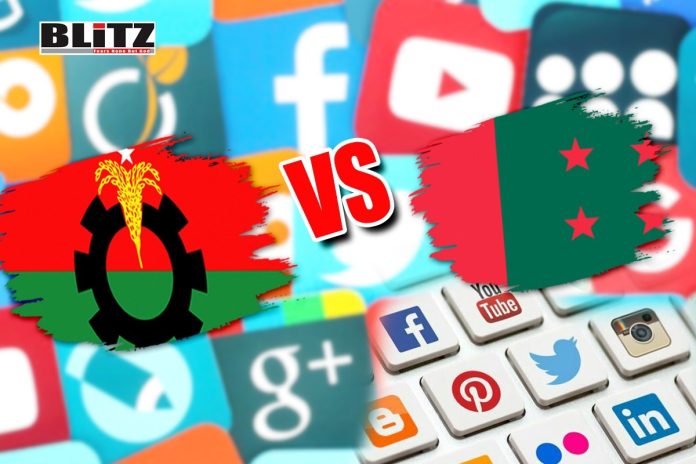In the ever-evolving landscape of Bangladeshi politics, the interplay between traditional power dynamics and digital activism has reached a critical juncture. At the heart of this complex narrative are the Bangladesh Nationalist Party (BNP) and the ruling Awami League, locked in a struggle for legitimacy and control. Examining the multifaceted dimensions of this struggle sheds light on the intricate dynamics shaping the country’s political discourse, both domestically and on the global stage.
For more than fifteen years, the BNP has been sidelined from state authority, as the Awami League, under Prime Minister Sheikh Hasina’s leadership, has maintained a strong hold on governance. The recent triumph of the Awami League in the 12th National Assembly elections not only prolonged its term but also sparked heightened discussions regarding the credibility of the electoral process. Despite prevailing through established channels, the Awami League has come under scrutiny and faced criticism from multiple sources, including foreign bodies like the United States and the European Union.
Central to the BNP’s challenge to the ruling party’s legitimacy is its refusal to participate in the electoral process under the current government’s auspices. Advocating for the formation of a caretaker government before elections, the BNP has boycotted successive polls, questioning the fairness and transparency of the electoral framework. However, this stance has faced challenges, as the BNP struggles to mobilize widespread support and engagement among the populace.
At the core of the BNP’s resistance lies Begum Khaleda Zia, the party’s chairperson, who has been sidelined from active politics due to health and legal issues. In her absence, Tarique Rahman, the acting chairperson, wields influence over party affairs from London, despite facing corruption charges and legal proceedings. Tarique Rahman’s ability to mobilize support and coordinate online activism underscores the evolving nature of political engagement in the digital age.
The proliferation of online activism has emerged as a critical battleground in Bangladesh’s political landscape. Through platforms like Facebook, YouTube, and Twitter, BNP-affiliated activists disseminate a blend of anti-government propaganda and partial truths, targeting not only the ruling party but also prominent figures and institutions. Despite government efforts to address this issue, including identifying key propagandists and their online activities, decisive action has been lacking, allowing the BNP to maintain a significant presence in the digital sphere.
Prominent online activists like Pinaki Bhattacharya, with sizable followings across various social media platforms, highlight the shifting dynamics of political influence in Bangladesh. Exploiting the reach and immediacy of digital platforms, Bhattacharya and others critique the government and its policies, contributing to a narrative that challenges the ruling party’s authority and vision for the country.
Numerous individuals, such as Zulkarnain Sami, who was expelled from Hungary and currently resides in London, ex-army officer Major Delwar Hussain, who sought refuge in Canada, and convicted Interpol-wanted militant financier Colonel Shahid Uddin Khan, a suspect in the Holly Artisan attack, along with Lt. Col. Mustafizur Rahman, a retired army officer living in America, and Jamaat Shibir cadre and self-proclaimed homosexual Nazmus Saqib, who sought political asylum in America, are among those who engage in online activism against the government. There are also individuals residing in Canada who are involved in extortion, as well as fake journalists associated with the terrorist organization Al Qaeda. CEO Tito Rahman of Nagorik TV, based on YouTube and Facebook, is another notable figure. Additionally, Abdur Rab Bhutto is among the so-called expatriate journalists residing in London. The language used by these individuals in their posts against the government and Prime Minister Sheikh Hasina on social media is highly objectionable.
However, it remains unclear if any initiatives have been undertaken to address this issue. Nevertheless, it is evident that the relevant department has failed in its duties. Despite being identified by the BNP, Twitter, Meta, or YouTube, these online activists do not face any consequences for their false propaganda or content.
The language and tactics employed by these online activists often veer into contentious territory, with accusations of misinformation and inflammatory rhetoric muddying the digital discourse. While efforts to address these issues have been initiated, the lack of tangible outcomes suggests a broader failure to effectively counter the narrative propagated by the BNP and its affiliates.
The recent removal of a post from the verified Facebook page of the Bangladesh Awami League underscores the challenges faced by the ruling party in combating online propaganda. Tanmoy Ahmed, a spokesperson for the Center for Research and Information (CRI), affiliated with the Awami League, expressed concerns about the platform’s safety and criticized Facebook for its inaction despite profiting substantially from Bangladesh. Ahmed’s remarks underscore the urgent need for a more robust response to online threats to political stability.
The lack of a coordinated effort to address online propaganda reflects poorly on both the government and regulatory bodies like the Bangladesh Telecommunication Regulatory Commission (BTRC). As opposition voices grow louder in the online sphere, the Awami League’s leaders must acknowledge the seriousness of the situation and take decisive action to safeguard the country’s digital landscape.
Bangladesh’s political struggle has extended into the digital realm, with the BNP effectively leveraging social media platforms to challenge the ruling Awami League. Despite efforts to combat misinformation, the government has struggled to counter the narrative propagated by online activists. Urgent steps are needed to address this growing threat to political stability and ensure the integrity of Bangladesh’s digital space. Failure to do so could have far-reaching consequences for the country’s democratic institutions and societal cohesion.




